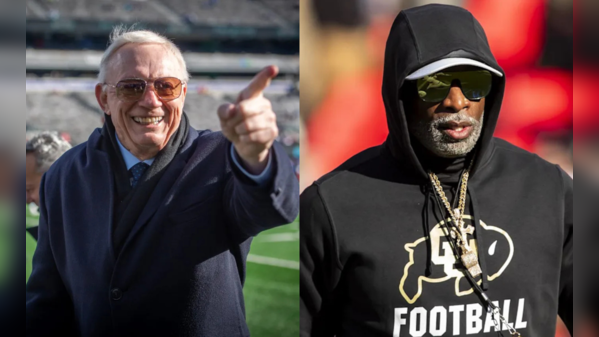Deion Sanders and Jerry Jones: could a cowboys coaching opportunity be on the horizon?

14-Jan-2025 08:38 PM
Deion Sanders’ potential move to the NFL gained attention after news broke that he had spoken with Dallas Cowboys owner Jerry Jones, following the team’s decision to part ways with Mike McCarthy. Despite Sanders’ success at Colorado, several obstacles could prevent a deal, including challenges in acquiring his son, Shedeur, and financial and personnel constraints. However, talks benefit both sides, even if they don’t result in a partnership.
When Bill Belichick moved to the college ranks in December, the NFL’s coaching carousel seemed to lack a prominent figure dominating the hiring process. That changed on Monday night. News broke that Colorado head coach Deion Sanders had spoken with Dallas Cowboys owner Jerry Jones, who earlier in the day confirmed the team was parting ways with Mike McCarthy after five seasons. Sanders later confirmed the communication. "To hear from Jerry Jones is truly delightful and intriguing," Sanders told ESPN's Adam Schefter on Monday night. "I love Jerry and believe in Jerry. After you hang up and process it, and think about it, it's intriguing. But I love Boulder, our team, the coaches, the student body, and the community." Even without a formal interview scheduled, the connection between two of football’s biggest brands has already generated significant attention. Sanders, 57, has built a reputation for fast turnarounds, first at Jackson State and now at Colorado. In his second season coaching the Buffaloes, he posted a 9-4 record and helped Travis Hunter win the Heisman Trophy. His Hall of Fame playing career, which included helping the Cowboys secure their last Super Bowl title in 1995, adds further intrigue. However, Sanders understands that not all coaching jobs are the same—especially one involving Jones, who serves as owner, general manager, and ultimate decision-maker for "America’s Team." Even as talks potentially continue, several hurdles could prevent a deal. Here are seven reasons why Sanders’ candidacy might falter: Sanders has hinted that his sons' involvement could impact his interest in an NFL job. "The only way I would consider (an NFL job) is to coach my sons," Sanders said last week on GMA3: What You Need to Know , referring to Shedeur, the star quarterback, and Shilo, a safety. While Jones values family dynamics, acquiring Shedeur would be difficult. Dallas currently holds the 12th pick in April’s NFL Draft, while Shedeur is expected to be a top-three selection. To move into the top two spots, Dallas would likely need to offer a trade package similar to the Chicago Bears’ 2022 deal for the No. 1 pick—a costly proposition that Jones might hesitate to pursue. Prescott’s four-year, $240 million extension makes trading him nearly impossible. A trade before June 1 would result in a $103.2 million dead cap hit. Additionally, Prescott holds a no-trade clause, giving him control over any potential move. At Colorado, Sanders rapidly reshaped the roster through the transfer portal. In Dallas, however, he would be limited by Jones’ longstanding refusal to relinquish general manager duties or embrace a full-scale roster reset. The Cowboys’ tight salary cap situation would further restrict any major personnel changes. Hiring Sanders would require an $8 million buyout to Colorado. Historically, Jones has been hesitant to pay for coaching changes, preferring to let contracts expire. His reluctance to absorb dead money, even for top talent, may complicate negotiations. Jones’ last four coaching hires have largely been experienced NFL head coaches, reflecting the franchise’s “win-now” mentality. Sanders’ transition from college to the pros would likely involve a learning curve, which could test Jones' patience with a veteran-laden roster. Unlike Jim Harbaugh, Sanders lacks extensive NFL coaching connections, making it difficult to assemble a pro-ready staff. His current offensive coordinator, Pat Shurmur, brings mixed results from his previous NFL roles, and retaining key McCarthy-era assistants might not offer the smooth transition Sanders would need. Even if no partnership materializes, both parties stand to gain. Sanders is likely due for a contract extension in Boulder, and discussions with Jones could strengthen his negotiating position. Meanwhile, Jones has once again placed the Cowboys at the center of NFL discourse, keeping them in the spotlight during the playoffs. As Jones himself said: "The fact that you and I are talking about an issue that seems, to you, controversial, is very much a part of the plan that will create interest."